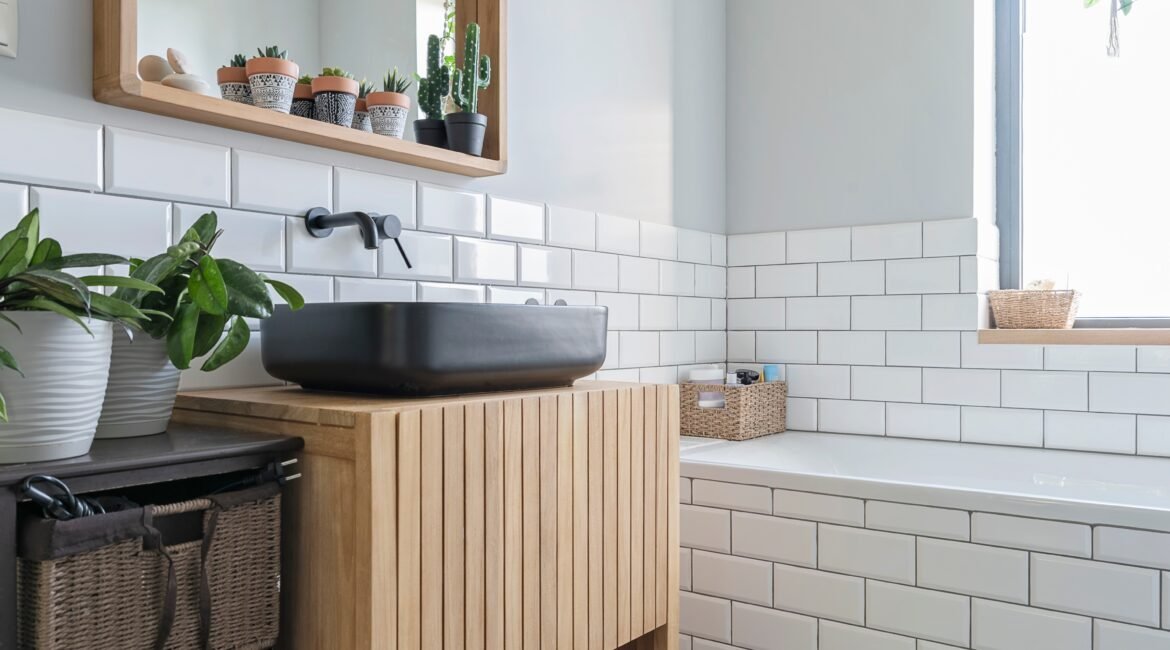Selecting the right materials for your bathroom remodel is one of the most important decisions you’ll make. The materials you choose impact not just aesthetics, but also durability, maintenance, and long-term functionality. At JEM Remodel and Construction, we’ve guided hundreds of homeowners through this selection process to create bathrooms that are both beautiful and built to last. This comprehensive guide will walk you through all the key material choices for floors, walls, countertops, and fixtures.
1. Bathroom Flooring Materials
Your bathroom floor needs to be waterproof, slip-resistant, and able to withstand daily wear. Here are the top options we recommend at JEM Remodel and Construction:
Porcelain Tile
- Pros: Completely waterproof, extremely durable (lasts 20+ years), available in endless styles
- Cons: Cold underfoot (pair with radiant heating), hard surface (can be tough on joints)
- Best for: All bathroom areas, especially showers
- Cost: $3-$10/sq. ft. installed
Ceramic Tile
- Pros: More affordable than porcelain, easy to clean, water-resistant
- Cons: Less durable than porcelain, can chip more easily
- Best for: Budget-conscious projects, powder rooms
- Cost: $2-$8/sq. ft. installed
Luxury Vinyl Plank (LVP)
- Pros: 100% waterproof, warmer underfoot than tile, comfortable to stand on
- Cons: Not as high-end looking as natural materials
- Best for: Families with kids, basement bathrooms
- Cost: $3-$7/sq. ft. installed
Natural Stone
- Pros: Gorgeous natural variations, adds luxury feel, increases home value
- Cons: Requires regular sealing (every 1-2 years), can stain, slippery when wet
- Best for: Master bathrooms where luxury is priority
- Cost: $5-$20/sq. ft. installed
Pro Tip from JEM Remodel and Construction: For shower floors, always choose small-format tiles (2×2 inches or mosaic sheets) for better slip resistance and proper drainage slope.
2. Wall Materials for Bathrooms
Bathroom walls must withstand constant moisture exposure. These are the top-performing options:
Shower Wall Options
- Ceramic/Porcelain Tile: The gold standard for shower walls. Use large-format tiles (12×24″) to minimize grout lines where mold can grow.
- Natural Stone Tile: Creates a luxurious spa look but requires more maintenance.
- Acrylic Solid Surface: Seamless, low-maintenance panels gaining popularity.
- Glass Tile: Stunning reflective quality but shows water spots easily.
Non-Shower Wall Options
- Moisture-resistant drywall (green board) with semi-gloss paint
- Beadboard wainscoting (top half painted, bottom half wood paneling)
- Waterproof wallpaper (for powder rooms only – not full bathrooms)
Our Designers’ Favorite Combinations:
- Floor-to-ceiling porcelain tile in shower + painted drywall outside shower
- Marble accent wall behind vanity + large-format tile elsewhere
3. Countertop Materials Compared
Your bathroom vanity countertop sees daily use from cosmetics, water, and cleaning products. Here’s how the top options compare:
Quartz
- Why we love it: Non-porous (won’t stain), never needs sealing, wide color range
- Downsides: Can discolor with prolonged UV exposure
- Cost: $50-$100/sq. ft.
Granite
- Why we love it: Each slab is unique, heat-resistant, adds home value
- Downsides: Requires annual sealing, can chip at edges
- Cost: $40-$200/sq. ft.
Solid Surface (Corian)
- Why we love it: Seamless installation, repairable, mid-range price
- Downsides: Can scratch more easily than stone
- Cost: $35-$85/sq. ft.
Laminate
- Why we love it: Most budget-friendly, new styles mimic real stone
- Downsides: Can delaminate with water exposure, not repairable
- Cost: $20-$50/sq. ft.
JEM Remodel and Construction Pro Tip: Always choose a countertop with an integrated backsplash (4″ tall minimum) to protect walls from water damage.
4. Shower & Tub Materials
Shower Bases
- Pre-fabricated acrylic: Affordable, easy to clean, but limited styles
- Tiled mortar bed: Customizable but requires expert installation
- Solid surface: Seamless look, moderate pricing
Bathtub Materials
- Acrylic: Lightweight, retains heat well, affordable ($400-$1,200)
- Cast Iron: Extremely durable but very heavy ($1,000-$3,000)
- Fiberglass: Budget option but scratches easily ($300-$800)
Glass Shower Doors
- Frameless: High-end look, easier to clean ($800-$2,500)
- Semi-frameless: Good compromise ($600-$1,500)
- Framed: Most affordable ($400-$1,000)
5. Fixture & Hardware Selection
Faucet Finishes
- Brushed Nickel: Hides water spots, timeless look
- Matte Black: Modern but shows mineral deposits
- Polished Chrome: Most affordable, shows fingerprints
Shower Systems
- Thermostatic valves: Maintain perfect temperature
- Digital controls: Set exact preferences
- Rain showerheads: Spa-like experience
JEM Remodel and Construction Recommendation: Invest in solid brass faucets (not plastic-lined) – they’ll last decades versus years.
6. Final Material Selection Tips
- Create a cohesive look: Choose 2-3 main materials and repeat them
- Consider maintenance: Natural stone = high maintenance, porcelain = low
- Get samples: View materials in your actual bathroom lighting
- Think long-term: Trendy choices may date quickly
Selecting the right bathroom materials ensures your remodel will be both beautiful and functional for years to come. At JEM Remodel and Construction, our designers help clients navigate these choices to create spaces perfectly tailored to their lifestyles and budgets. From helping you compare porcelain vs. ceramic tile to selecting the ideal countertop material, we’re with you every step of the way. Contact us today to schedule a material consultation and bring your dream bathroom to life!

